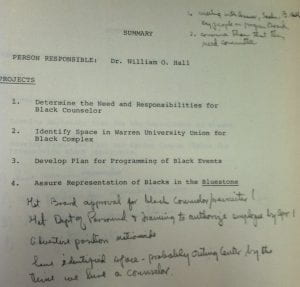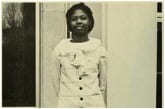Post Author: Alexandra Kolleda
After the 1978 Supreme Court decision in University of California v. Bakke, Affirmative Action received significant backlash from the public. Whites were becoming frustrated with what they called “reverse discrimination” (Schulman, 69-70). They feared that white students with high qualifications were being unfairly turned down in order to admit less qualified but diverse applicants. Even before Bakke, however, Madison College experienced this need to prove Affirmative Action’s worth. In order to do that, the administration felt they needed to make sure the African Americans they accepted went above and beyond all minimum admissions criteria. The first African Americans were admitted into Madison in the late 60s.

According to the Bluestone yearbook, these first African American students were outstanding, prominent members of the Madison community; however, it is important to indicate that, in the notes written on the 1978 Affirmative Action plan for James Madison University, at left, there was an order to feature African Americans in the yearbook, showing their numerous activities and contributions to the school. Thus, the prominence of these early women, despite how few they were in number, could also be attributed to a propaganda strategy, even as the school recognized the acceptance of incredible African Americans who were exceptionally qualified (Affirmative Action, 1978).

Sheary Darcus was the first African American to be formally admitted to Madison College. She was Vice President in Concert Choir her senior year, as well as a member of Alpha Beta Alpha, a library science honors fraternity. Darcus gave back to the Madison community as well, serving as a freshman counselor her senior year. She graduated in 1970 with a Bachelor of Arts degree in Library Science (Bluestone, 1967-1970). Darcus chose to continue her education at Madison College earning her master’s degree in 1974. She went on to get her Doctorate in Education in 1988 from the University of Virginia (Scott, 2010). Her credentials, spelled out in the Bluestone, emphasize her triumphant integration onto campus life.

Class of 1972
B.S. Elementary Education and Library Science
Bluestone, 1972
Sandra Johnson was accepted into Madison College in 1968. She participated in Concert Choir alongside Sheary Darcus for two years, taking Darcus’ place as Vice President her junior year. In her senior year, she claimed the title of President of the choir. She was also a member of Alpha Beta Alpha, graduating in 1972 with a Bachelor of Science degree in Elementary Education and Library Science (Bluestone, 1969-1972). Her dual major indicates her own spectacular achievements.

Saranna Tucker entered Madison College at the same time as Sandra Johnson. She participated in Delta Sigma Theta (an African American service sorority), and was the Vice President of Dance Theater her senior year (Bluestone, 1969-1972). She is pictured with the social science seniors in 1972, but her graduation information could not be found. Out of the four African American women pictured among the seniors in 1972, Sandra Johnson was the only one with her information listed in the Senior Directory, and her contributions to the Madison community are obvious (Bluestone, 1972).
While these women are prominently featured in the Bluestone, they do not represent a full cross-section of African Americans attending the Madison at this time. In September of 1972, when total enrollment passed 5,000, there were 72 African Americans, including Johnson and Tucker, enrolled (Jones, 168). Perhaps the other 70 students did not have the quantity or kind of extracurriculars the yearbook editors wanted to highlight. Other collections, like scrapbooks for the Black Student Alliance, might document their activities and contributions better.
Works Cited:
James Madison University Affirmative Action Plan. Special Collections, Carrier Library, James Madison University, Harrisonburg, VA. 1978.
The Bluestone. Harrisonburg: James Madison University, 1967-1972.
Jones, Nancy Bondurant. Rooted on Blue Stone Hill: A History of James Madison University. Staunton: Center for American Places, 2004.
Schulman, Bruce J. The Seventies: The Great Shift in American Culture, Society, and Politics. Cambridge: Da Capo Press, 2002.
Scott, Fred. “Madison Mahogany Memoirs.” James Madison University Black Alumni Chapter. 2010 Program.
